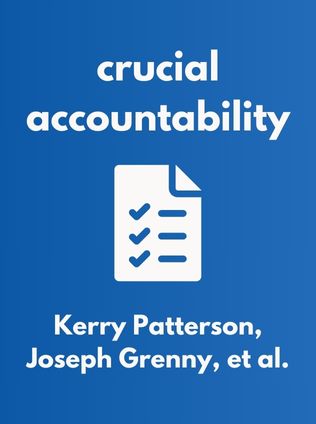
Crucial Accountability
Tools for Resolving Violated Expectations, Broken Commitments, and Bad Behavior, Second Edition ( Paperback)
By Kerry Patterson, Joseph Grenny, et al.
Published 08/2004
About the Author
Kerry Patterson, Joseph Grenny, David Maxfield, Ron McMillan, and Al Switzler are leading authorities in the realm of interpersonal communication, organizational behavior, and leadership. They have authored several best-selling books that provide practical strategies for improving workplace dynamics and personal relationships. Their collaborative work is grounded in decades of research and practical experience, making their insights highly applicable across various settings. Beyond their writing, they have also co-founded Crucial Learning, a company dedicated to teaching leadership and communication skills through specialized courses and workshops. Each author brings a unique perspective and expertise, making their collective work a rich resource for anyone looking to improve their accountability and communication skills.
Main Idea
"Crucial Accountability" is a comprehensive guide to managing and mastering accountability conversations—those difficult discussions that arise when someone fails to meet expectations or breaks a commitment. The book emphasizes the importance of handling these conversations with skill to avoid damaging relationships, while still addressing the issues at hand. By following the authors' strategies, readers can learn how to prepare for, execute, and follow up on accountability conversations in a way that preserves mutual respect, fosters collaboration, and achieves positive outcomes. The core message is that accountability is not just about addressing failures, but about reinforcing a culture of integrity and trust in any relationship, whether personal or professional.
Table of Contents
- Why Accountability Conversations Are Crucial
- Preparing for the Discussion
- Executing the Accountability Conversation
- Handling New Issues That Arise
- What NOT to Do While Discussing Accountability
- Following Up
1. Why Accountability Conversations Are Crucial
The authors begin by exploring the critical importance of accountability conversations. When someone breaks a promise, behaves poorly, or fails to meet expectations, it’s crucial to address the issue to prevent long-term damage to the relationship. Ignoring such issues can lead to toxic communication patterns, passive-aggressive behaviors, or even the breakdown of the relationship altogether. These conversations are not just about fixing immediate problems but are also about maintaining and improving the quality of relationships over time.
Many people shy away from these conversations due to fear of confrontation or uncertainty about how to approach the subject. However, the authors argue that avoiding these discussions can lead to more significant problems down the line. For instance, failing to address repeated poor performance in a workplace setting can result in a decline in team morale and productivity. Similarly, unresolved personal issues can create distance and resentment in relationships.
- Workplace Example: A manager ignores an employee’s consistent tardiness, leading to resentment among team members and a decline in team morale.
- Personal Example: A friend repeatedly cancels plans at the last minute, causing frustration and a growing distance in the relationship.
- Family Example: A parent overlooks their teenager's increasingly poor grades, thinking it's just a phase, only to find out later that the lack of accountability has affected the child's academic future.
The authors emphasize that when these issues are not addressed, they often escalate, leading to even more significant problems. The key is to approach these conversations with the right mindset and skills, which is what "Crucial Accountability" aims to teach.
"If we communicate our interpersonal conflicts without planning ahead, we risk inciting emotional reactions from the other person such as resentment, jealousy, frustration, and even hatred." – Kerry Patterson and co-authors
The book highlights the psychological barriers that prevent people from engaging in these necessary conversations. People often downplay the costs of silence, exaggerate the risks of speaking up, or believe they are helpless in resolving the issue. These are not valid reasons to avoid accountability conversations. Instead, they are often rooted in fear and a lack of skills, which the authors aim to address through their step-by-step guide.
For example, consider the case of a team leader who avoids confronting a team member about their lack of contribution to a project. The leader may fear that bringing up the issue will lead to conflict or demotivate the team member. However, by avoiding the conversation, the leader allows the problem to persist, which can demoralize the entire team and lead to project failure.
2. Preparing for the Discussion
The next section of the book delves into the preparation needed for a successful accountability conversation. The authors stress that preparation is crucial for ensuring that the conversation is productive and does not devolve into a conflict. The first step in preparation is identifying the key issue at the heart of the problem. Often, accountability grievances come in bundles, but there’s usually one underlying problem that, if resolved, will also address the other issues.
Sign up for FREE and get access to 1,400+ books summaries.
You May Also Like
The Subtle Art of Not Giving a F*ck
A Counterintuitive Approach to Living a Good Life
By Mark MansonRich Dad Poor Dad
What the Rich Teach Their Kids About Money - That the Poor and Middle Class Do Not!
By Robert T. KiyosakiHow To Win Friends and Influence People
The All-Time Classic Manual Of People Skills
By Dale CarnegieQuiet: The Power of Introverts
The Power of Introverts in a World That Can't Stop Talking
By Susan Cain



















